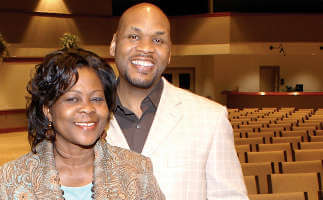I could sense heaven’s ecstatic joy last weekend when I visited a multiethnic church in Montgomery, Ala.—birthplace of the civil rights movement.
There were two very separate worlds in Montgomery, Ala., when I lived there as a child. I lived in the white world, on the east side of town in the Dalraida area. Everybody at Dalraida Baptist Church was white. All the kids at Dalraida Elementary School were white. The only black people I saw in my neighborhood on Green Forest Drive were the maids who arrived each day to clean houses.
I was oblivious to what was happening in Montgomery in 1964 when I started school. No one told me about Martin Luther King Jr., who fueled the civil rights movement from his pulpit at Dexter Avenue Baptist Church downtown. I didn’t know about the bus boycotts, the lunch-counter sit-ins or the 1963 bombing of a church in Birmingham that killed four black girls.
| “People spontaneously gathered near the stage and began to dance, so I joined them—even though it is often assumed that white men can’t really move their feet.“ |
I don’t exactly know what I was doing on March 25, 1965. I was probably learning how to add and subtract numbers in Mrs. Bowland’s second-grade classroom. But at King’s church that day, he was preaching his now-famous sermon, “Our God Is Marching On.” He asked his congregation how long racial injustice would continue in Alabama:
“Montgomery was the first city in the South in which the entire Negro community united and squarely faced its age-old oppressors. … Alabama has tried to nurture and defend evil, but evil is choking to death in the dusty roads and streets of this state. … How long [will injustice continue]? Not long, because the arc of the moral universe is long, but it bends toward justice.”
I wish I could have heard King proclaim those sobering words, but I was only 7, and the white world I lived in did not intersect with King’s world. I never heard his eloquent sermons until years later. I would have to grow up before I understood that white people—including many sincere Christians living in Montgomery—chose to live in denial instead of challenging racism’s ugliness.

What is so remarkable about Fresh Anointing (besides the fact that this multiethnic church has grown to 1,200 adults in a city known for racism) is the history of its building. The facility was once an event center/night club, built by an infamous Montgomery drug dealer. But he was busted and went to prison, and Searcy was able to buy the huge property at a deep discount.
Says Searcy: “The very day this drug dealer was sentenced to 40 years in prison, we moved in to our facility. That’s cool.”
Today the remodeled building, with a 2,000-seat worship center, is a showcase of the power of Christ to transform lives. That is special to Searcy, who spent part of his teen years in nearby Tuskegee, Ala., where he saw his share of racial tension.
“It really amazes me to see the power and glory of God displayed here in our midst,” Kyle told me. “It is a testimony to the Lord of how He is able to redeem. Obviously one of the main spiritual principalities here in this region is racial division. But the Lord has seen fit to give us a breakthrough.”
I could sense that breakthrough Sunday morning about halfway through the extended worship time. People spontaneously gathered near the stage and began to dance, so I joined them—even though it is often assumed that white men can’t really move their feet.
I danced so hard that my shirt was drenched with sweat by the time I was supposed to preach. I apologized to the crowd and told them I had praised my sport coat off. They cheered, not just because I felt the freedom to be casual but also because we could sense a little bit of heaven in the room that day.
I believe heaven smiles whenever we break down ethnic barriers to make way for the kingdom. And if leaders like Kyle Searcy keep up this trend, the pain and mistrust that has controlled places like Montgomery will be swept away forever.
J. Lee Grady is editor of Charisma. You can find him on Twitter at leegrady. You can learn more about Fresh Anointing House of Worship at www.anointedchurch.org.






Leave a Comment
You must be logged in to post a comment.